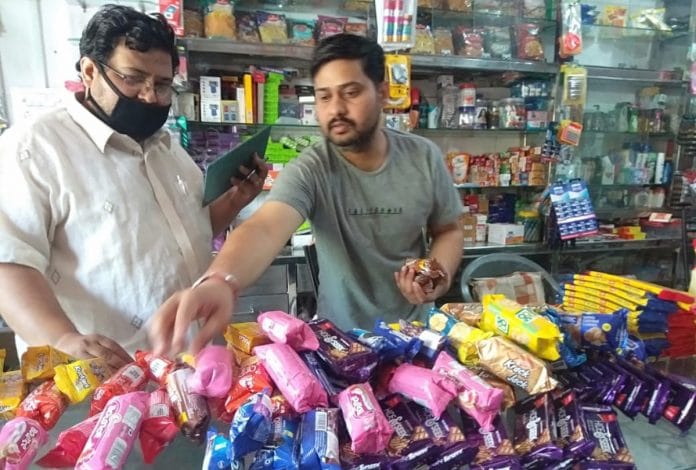After more than a decade of romance with malls and big departmental stores, the Indian urban middle class has rediscovered the neighborhood kirana store and the ‘bhaiyya’ who runs it. All thanks to the coronavirus lockdown.
The transition from malls to the local kiranas might not be a happy one for every urban and privileged Indian, but if it hadn’t been for them, we would forever be stuck in long queues outside departmental stores for the simplest of items.
“Abhi toh yahan aas-paas ke bade log bhi aate hai. Pehle toh gaadi leke dur mall se laate the sab cheez, ye dukan dekhte bhi nahi the (the rich people from the area have started visiting my shop. Previously, they would go to malls in their cars to buy everything, and wouldn’t even look at our shops),” a man from a kirana in Delhi told me when I asked him if his customers have increased. Two other shopkeepers confirmed this.
Talking about the change in the attitude of the Indian urban class, a shopkeeper said, “Ye log aaj kal baat-cheet karte hai saman lete waqt, pehle toh galti se aa bhi gaye to kabhi kuch bolte nahi thhe (Now they talk to us when they come to buy things. Before this lockdown, even if they came, they would never talk to us).”
Also Read: Life beyond Netflix — this is how urban India is keeping itself entertained at home
Renaissance of kiranas
Last evening, after a woman bought chocolate sauce and packets of nuggets, paid and left the kirana shop, the shopkeeper turned to me and said, “Unko pehle lagta tha ki hamara saman sahi nahi hai, ab har bar expiry date check bhi nahi karte saman lete time (She used to think that we don’t sell fresh goods, now they don’t check the expiry date before buying).” I noticed the spark in his eyes when he said that. There was a different kind of enthusiasm in him to attend to his customers.
In these grim times, ‘bhaiyyas’ are the sole rescuers. If it wasn’t for these local shops, we would be standing in queues even for staples like eggs, bread and milk, which obviously need to be restocked every couple of days.
“We don’t usually come to this shop, but now when we get all daily essentials here to survive, why go far to the supermarket. It is more convenient to buy from here,” a customer told me during a conversation over the availability of essentials.
Also Read: Centre tells states to punish those hoarding, black marketing essentials during lockdown
‘Bhaiyya please de do’ mode
“Arey madam, abhi toh log aisa aisa samaan mangte hai jo pehle kabhi nahi maangne aaye (Now people ask us for things they never came to our shops for before),” a kirana manager said to me during a conversation over supply of goods.
From expensive chocolates to fancy beauty products like L’Oreal creams and Tresemme conditioners to flavoured Nachos, these kiranas have become the new shopping destination for the urban Indians. I have observed a sudden behavioural change in them too — from not even speaking to these shopkeepers to going to the ‘bhaiyya please de do’ mode.
Now if the shopkeeper doesn’t have certain things from the to-buy list, people start requesting him or her to arrange it for them and also get frustrated if the demands aren’t met. Last week, when the local shopkeeper told two women that he had run out of soft drinks, I could see the annoyance in their eyes.
Another customer requested the kirana owner to arrange for ‘Yippie’ noodles for his children. The shopkeeper, who has now become a saviour for many urban Indians, promised to give this customer a ‘phone call’ whenever the noodles are restocked — something which is unlikely to happen in a mall.
The urban middle class has also learnt to be patient, in contrast to being always in a ‘hurry mode’. Here, one has to wait for their turn in the circles drawn outside the shops. The kirana shops are teaching the Indian urban middle class discipline.
There’s a movement world over to buy local and encourage farm producers and indigenous products, and help the economy. India is being forced to fall in line with this idea during the lockdown.
Also Read: Let’s talk first— Coronavirus is bringing in unheard of changes on Tinder and Hinge
New spot for ‘romance’
There’s another curious behaviour change in urban Indians after the lockdown.
The middle-class youth can neither chill in their homes with their friends and partners, nor can they go to restaurants, bars, malls and parks.
In this scenario, the kirana shops have emerged as the new dating spot for the couples living in the same vicinity, where they get some time to talk to each other in person while buying essentials. From their one-metre-apart circles of course.
I have seen many young men and women talking to each other ‘romantically’ while standing outside the kirana shops. Talking about his shop becoming an unusual hang-out spot, a shopkeeper told me that young people who normally don’t come to his shop have now started using ‘bhaiyya’s shop’ as an excuse to come downstairs and meet their friends.
Views are personal.






